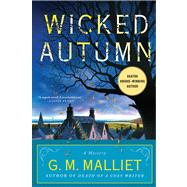
"G. M. Malliet has brought the village cozy into the 21st century--where else could the Vicar be retired from MI5? Written with dry humor and a wickedly accurate portrait of the modern English village, Wicked Autumn is a refreshing and fun read for everyone who loves a really good murder." --Charles Todd, NY Times Best-selling author of the Inspector Ian Rutledge Series
The New copy of this book will include any supplemental materials advertised. Please check the title of the book to determine if it should include any access cards, study guides, lab manuals, CDs, etc.
The Used, Rental and eBook copies of this book are not guaranteed to include any supplemental materials. Typically, only the book itself is included. This is true even if the title states it includes any access cards, study guides, lab manuals, CDs, etc.